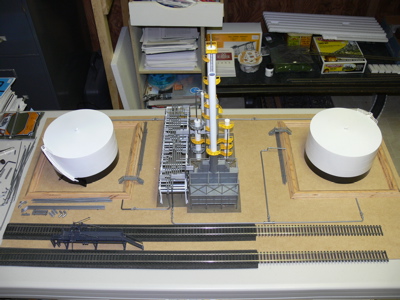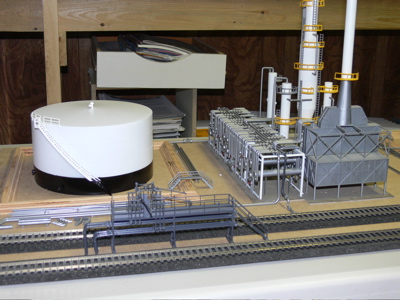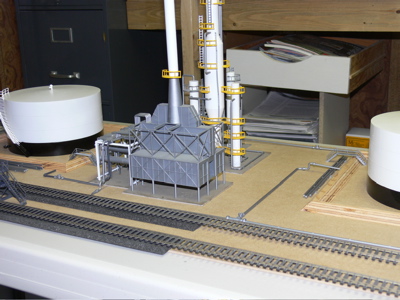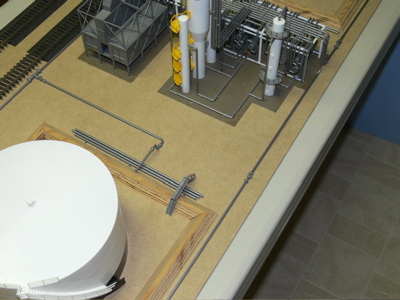Tuesday August 15, 2006 5:20 am Lethbridge Alberta Sunrise 6:21 Sunset 8:50 Hours of daylight: 14:29
|
|
From rear window |
South patio |
Both images taken at 11:40 am |
A. Morning Musings
7:30 am It is + 11 C at the moment, with a forecast high of + 24 C. There is a 60% chance of showers this afternoon. This would be welcome as we have not had any rain in over a month.
B. Plan
| Immediate |
|
|
| Health |
Walk & exercise |
1 hr |
| History |
Continue reading "Citizens" |
3 hr |
| Mathematics |
Read "The Computational Beauty of Nature" Chap
3 |
1 hr |
| Model Trains |
Build oil refinery diorama: add piping to connect oil tanks to refinery and to loading platform |
2 hr |
| Literature |
Begin reading "All the Men Are Sleeping" |
1 hr |
| Later |
|
|
| Chores |
Investigate water softeners for home |
1 hr |
| Technology |
Read manual for cell phone |
1 hr |
| |
add keywords to iPhoto records |
|
| |
Make notes for chap. 4 of "Switching to the Mac" |
2 hr |
| |
Begin reading "iPhoto" |
1 hr |
| |
digital photography - learn about using the various manual settings |
|
| Mathematics |
Larson "Calculus" |
|
| |
Gardner "The Colossal Book of Short Puzzles" |
|
| History |
Watson "Ideas" |
|
| Model Trains |
Build oil refinery diorama: add ground cover |
|
| |
Add blue backdrop to layout |
|
| |
Assemble second oil platform kit |
|
| |
Redraw diagram for Lower Mainline control panel |
|
| |
Wire Lower Mainline turnouts |
|
| |
|
|
C. Actual/Notes
|
|
|
History Chronology |
Notes for "Citizens" (1989) by Simon Schama.
5:40 am Yesterday I finally returned to the book "Citizens" by Simon Schama. I was delighted with my approach to note-taking, particularly the use of Inspiration to create a chart of the overall situation of Learning about the French Revolution. For me, it is important to play with alternative representations of my understanding. Thus the chart provides a visual overview of the topic and reminds me of the overall situation, focusing on the key people and events as well as on a triparte structure of causes-description-results. Another feature of this chart is that it will show my growth in understanding over time as each day will highlight the new additions in bold.
Now for a comment on memory. Mine is not so good when it comes to topics that I do not use regularly (such as history). When I began making my notes yesterday I could not recall much of what I had read a few months ago. I also could not locate a table that I remembered creating that provided a form of time map of events. Late yesterday evening I located the table which I should have been able to find easily by simply referring to my Notes index. My problem was that I assumed that my notes from before had been created using a different structure and a separate web site for each topic. But it turns out that my new approach to the web site began at the beginning of June of this year and coincided with my earlier attempt to begin reading "Citizens". In any event, the real issue is how little I remembered about the book. And the remedy is equally obvious. I need to establish some form of regular review.
Further to this, I need to recognize the huge difference between recognition and recall. It is easy to reread something and say, "I remember this." It is much more difficult, and much more important, to be able to recreate totally from memory, the important points. Thus I should begin each session with an attempt to identify the key people and events as well as important points about the historical setting (aka causes of the Revolution). And by making this explicit, I will also have an audit trail of my Learning path. To begin, totally from memory:
- Key people
- Lafayette
- Talleyrand
- Louis XVI
- Vergennes (Foreign Minister)
- Turgot (Controller-General) [Finance]
- Key events
- Seven Years War (Dates?)
- Coronation of Louis XVI in 1763 (?)
- Setting
- France's economy is very weak. It has spent a huge amount of money supporting the American War of Independence and has committed itself to having both a large army and a large navy.
- The American War of Independence had a large influence on the French idea of fighting for liberty.
Now to "mark"the above effort by comparing it with my notes as well as with a quick skim of the first chapter. Excellent! I have all of the important names from the first chapter and have actually added 2 events and one setting that are not on my chart.
I need to check the dates for the Seven Years War as well as the coronation of Louis XVI. Using Google and the Web makes this easy.
Google: "Seven Years War" France Britain
http://en.wikipedia.org/wiki/Seven_Years'_War This occurred from 1756 - 1763.
http://www.thecanadianencyclopedia.com/index.cfm?PgNm=TCE&Params=A1ARTA0007300
Google: Louis XVI coronation France
http://chnm.gmu.edu/revolution/browse/timeline/ The coronation took place in 1775, one year after he became king following the death of Louis XV.
http://chnm.gmu.edu/revolution/d/235/
I am having difficulty getting some of my dates firmly in mind. The Seven Years War was from 1756 to 1763. This was the war that is critical to Canadian history, as this was when Britain took control of the French colonies in North America. Wolfe defeats Montcalm at Quebec in 1759. Louis XVI becomes king in 1774 and has his coronation in 1775. This is the same year that the American War of Independence began.
Finally, after reading the chapter yesterday and making my notes, I then located the table that I recalled making in June. I will copy & paste it into my notes at this point as I feel it provides an excellent time chart for the events leading up to the Revolution. I will then continue to add to it as I continue reading the book. The table originally appeared in the June 21 journal entry and includes notes for the first 4 chapters of "Citizens". I have changed the background of some entries to yellow to highlight those as "more important". |
Date |
Person |
Event |
Commentary |
Page |
| 1200 -1800 |
|
Parlements |
"The Parlements were 13 sovereign courts of law, sitting
in Paris and provincial centers, each comprising a body
of noble judges that, in different Parlements, numbered
from 50 to 130."
They handled both criminal and civil cases and acted
as censors of theatre and literature and as guardians
of social and moral propriety. "they also shared with
the King's bureaucrats ... administrative responsibility
for provisioning cities, setting prices in times of dearth
and policing markets and fairs."
The robins (the judicial nobility of the 'robe') `were
intensely self-concious of their collective dignity and
jealous of any attempts to encroach on their local authority.' |
105
106 |
| 1643 - 1715 |
Louis XIV |
"the sun king" |
very popular |
|
| 1715 - 1774 |
Louis XV |
|
indecisive and unpopular
his fiscal policies became more aggressive following
each of his major wars
"Since the 1750's the tone of Parlementaire resistance
to royal policy had been irate vehemence. ... it represented
a concerted effort to replace the unconfined absolutism
of Louis XIV with a more 'constitutional' monarchy."
"As the disputes with the Parlements over religious and
tax policies at the end of his reign became more acrimonious,
so the King became more adamantly absolutist." |
100
103 |
| 1721 - 1794 |
Malesherbes |
In charge of the royal houshold under
both Louis XV and Louis XVI. |
Malesherbes and Turgot were 2 of
the most powerful men in France.
He was very popular.
he tried to constrain rather then enforce the authority
of absolutism and supported fundamental liberties such
as freedom of the press and unfair taxation
"Much of Malesherbes' urging that the King should give
public demonstrations of a new candor and public-spiritedness
fell on deaf ears, or was defeated by the claims of traditional
decorum..." |
100
102 |
| 1700 - 1788 |
|
system of "privilege" |
Privilege was defined as various forms
of tax exemption.
Under Louis XVI "the crown's own position with
regard to privilege was deeply ambiguous" On one
hand it wanted to extend its control over the bureaucrats
but on the other it wanted to extend the number of privileges
because of the money it received.
"Privilege was not a monopoly of the nobility."
"the reasons for promotion were service, talent and
merit. ... At the very heart of the French elite, then,
was a capitalist nobility of immense significance to
the future of the national economy." |
115
118 |
| 1700 - 1788 |
|
system of "venality" |
Venality was the sale and purchase
of office. This was "more deeply and broadly rooted
in France than in any other major power in Europe."
|
68 |
| 1700 - 1788 |
|
taxation |
there was eloquent hatred among all
sections of society of the tax collecting apparatus, particularly
the Farmers-General. This was a syndicate of men who paid
the Treasury a certain sum in return for the right to "farm" (i.e.
collect) certain indirect taxes such as for salt and tobacco. |
72 |
| 1756 - 1763 |
|
Seven Years War |
European counterpart to the war in America between the
English and the French |
|
| 1740 - 1780 |
Denis Diderot |
writer & playwrite |
popular |
|
| 1760 - 1800 |
Jean-Baptiste Greuze |
artist |
painted French culture with a Romantic sensibility |
152 |
| 1760 - 1778 |
Jean-Jacques Rousseau |
author |
political ideas influenced the French Revolution |
155 |
| 1760's |
Simon Linguet |
lawyer, public speaker |
emphasized the value of the spoken word over that of
the printed word and this became highly prized during the
Revolution.
the Revolutionaries emulated the great Roman orators
(Cicero, Senaca, Cato) |
167 |
| 1770 - 1800 |
|
|
"The closing decades of the old regime were remarkable
for the number of cultural phenomena in which popular and
elite tastes converged." |
131 |
| 1770 |
|
|
The system of Parlements was abolished. |
108 |
| 1774 |
Louis XVI |
Ascended to the throne at age 19 |
|
|
| 1774 |
Vergennes |
Appointed Minister of Foreign Affairs |
|
|
| 1774 |
Turgot |
Appointed Controller-General |
Malesherbes and Turgot were 2 of the most powerful men
in France. |
|
| 1775 |
Louis XVI |
Coronation |
|
|
| 1775 |
|
|
The system of Parlements was reinstituted |
110 |
| 1775 - 1800 |
|
|
there was a strong underground press that produced books,
pamphlets, daily newspapers about the latest events and
ideas |
176 |
| 1775 - 1783 |
|
American War of Independence |
"For France, without
any question, the Revolution began in America." |
24 |
| 1776 - 1783 |
Vergennes |
French foreign policy of supporting
the American alliance ... while maintaining a strong army
in Europe |
"... the costs of Vergennes
global strategy policy brought on the terminal crisis
of the French monarchy"
"No other European power attempted to support
both a major continental army and a transcontinental
navy at the same time."
"More than any inequity in a society based on
priviledge, or the violent cycles of famine that visited
France in the 1780's, the Revolution was occasioned
by these decisions of state." |
62 |
| 1777 |
Lafayette |
Valley Forge USA |
Lafayette was with Washington at this battle.
Lafayette idolized Washington |
24 |
| 1777 |
Jacques Necker |
promoted to Director-General |
|
|
| 1778 |
|
France enters into treaty relations with the USA |
|
|
| 1779 |
|
French plans to invade England thwarted by bad weather |
|
|
| 1779 |
Lafayette |
returns to France |
|
|
| |
Benjamin Franklin |
|
promoted the patriot cause on both sides of the Atlantic |
|
| |
Talleyrand |
|
|
|
| 1781 |
Jacques Necker |
resigns as Director-General |
|
|
| 1783 |
|
Treaty of Paris |
Great Britain recognizes the USA |
|
| 1783 |
Vergennes |
cash-flow crisis |
"So in absolute terms, even after
the immense fiscal havoc wrought by the American war, there
are few grounds for seeing the scale of the French deficit
as necessarily leading to catastrophe. But it
was the domestic perception of financial problems, not
their reality, that propelled successive French governments
from anxiety to alarm to outright panic. The determining
elements in the money crisis of the French state, then,
were all political and psychological, not institutional
or fiscal." |
65 |
| 1783 - 1788 |
|
debt |
although the French debt was comparable
to the British debt, the French deficit was viewed as "royal" while
the British was considered "national" |
64 |
| 1789 - 1799 |
|
French Revolution |
"The causes of
the French Revolution were located deep within the
structure of the society that preceded it."
It is at the top, rather
than in any imaginary middle of French society,
that the cultured roots of the revolution should
be sought."
The revolution did not create French patriotism, rather
it gave the patriotism an opportunity to define itself
in terms of 'liberty'." |
6
40
|
| 1789 |
|
Storming of the Bastille |
|
|
| |
|
|
|
|
The above table contains information on the first 4 chapters of "Citizens" which I first created in June. At the moment I am rereading the book and am about to begin chapter 2. I have three different forms of notes: an Inspiration chart, the above table, and a set of important quotations from the book.
While Googling "French Revolution" in order to get the dates, I noticed this web site:
http://www.sparknotes.com/history/european/frenchrev/
This contains a set of notes which closely parallels the notes that I am creating. I might take that as a sign that I am on the right track. But this does raise the question of whether it makes sense to create my own notes or should I simply read the notes that have been prepared by others.
|
Part One: Alterations - The France of Louis XVI
Chapter Two Blue Horizons, Red Ink [p. 50 - 95]
- The coronation of Louis XVI in 1775 was intended to be a lavish spectacle that symbolized the relationship between the king and his people. But the majority of people viewed it as extravagent in a time of famine and economic hardship.
- "... he [Louis XVI] chose to live in a world of numbers rather than words, lists rather than utterances. ... Even the pastime into which he flung himself with the greatest enthusiasm - hunting - was reduced in writing to lists of the daily bag. So that in July 1789 - the month his monarchy collapsed - we know more about his daily kill than we do of his thoughts on the political events in Paris." [p. 54]
| A similar comment might be made about my journal entries. Instead of a list of daily kills, I have a list of tasks to be completed. But there is not much reflection on my views on most current affairs. I am beginning to add images, which is an improvement, but there is still very little of me in the pages. In a sense this is deliberate - I am a fairly private person and restrict my public persona to issues related to Learning. I should try to improve this by using the last section of the day (which I almost never use) for comments on Education and the uses of technology. If I really play with this I might be able to collect such thoughts after a year or so and form some kind of coherent statement. |
- Vergennes, the Foreign minister, supported the American forces in the American War of Independence as well as re-establishing a strong naval presence in both the Atlantic and Indian oceans and maintaining a large continental army. "No other European power attempted to support both a major continental army and a transcontinental navy at the same time. ... More than any inequity in a society based on privilege, or the violent cycles of famine that visited France in the 1780's, the Revolution was occasioned by these decisions of state." [p. 62]
| According to Schama, this is the heart of the matter and the primary cause for the French Revolution. |
- "... the French deficit was burdened by being broadly conceived by the public as 'royal' while the British debt was held to be 'national'. ... So in absolute terms, even after the immense fiscal havoc wrought by the American war, there are few grounds for seeing the scale of the French deficit as necessarily leading to catastrophe. But it was the domestic perception of financial problems, not their reality, that propelled successive French governments from anxiety to alarm to outright panic." [p. 64 - 66]
- "All European warrior states in this period - and for a long time to come - drew their revenue from three sources: direct taxes usually (as in France) collected by state officials, loans from groups, institutions and individuals all of whom aligned their private interest with the interest of the state; and finally indirect taxes which in some places were administered by bureaucrats and in some places leased out to individuals who would advance the state a sum of money in return for the right to collect taxes themselves." [p. 70]
- "At the root of its problems was the cost of armaments when coupled with political resistance to new taxes and a growing willingness of governments to accept high interest-bearing obligations from both domestic, and increasingly, foreign creditors." [p. 71]
- The Farmers-General was a syndicate of men who gave the government money in return for the right to collect certain taxes such as salt and tobacco taxes. About 1/3 of all French revenue came from this system. There was a large gap between what the government received and what was collected and this was a source of much public resentment. [p. 72 - 73]
- Turgot became Controller-General in 1775 and immediately instituted a number of economic reforms intended to address the financial problems of the country. He tried to encourage a free economy by eliminating many of the barriers that existed in French society. One of these was the abolition of trade guilds "which confined labor, production and sale of commodities to licensed corporations with their own internal monopoly of training, goods and services." He was unpopular and replaced in 1776.[p. 85]
- Turgot was replaced by Necker, a Swiss banker who continued the reforms by attempting to find areas where waste was most conspicuous. He resigned in 1781.
This chapter focuses on the economic difficulties of France in the period when Louis XVI first became king. It describes the efforts of Turgot and Necker to rectify matters, but they both were relieved of their office after a short, unpopular term.
Now to add a few items to my Inspiration chart.
9:15 am |
|
|
Model Trains 31
August 15
|
|
Model Trains Chronology |
8:50 PM I put in a solid couple of hours laying the piping for the oil refinery diorama. The time was evenly spent between deciding where to put the pipes and actually cutting and glueing all of the pieces onto the layout. That part is now finished. I still have to add a ground cover (soil for the tank berms and ground near the tanks, grass for the rest of the layout).
Here are a few images of the progress so far:
|
|
Birds eye view |
oil loading platform in foreground |
|
|
piping near crude oil tank |
another bird's view |
I am looking forward to adding the ground cover as this will be another new experience for me. Once I gain some confidence doing this, I will feel that I am in control as I work on the upper level where I have a coal mine and a lumber mill as well as the wooden trestle that all need some scenery additions.
|
D. Reflection |








